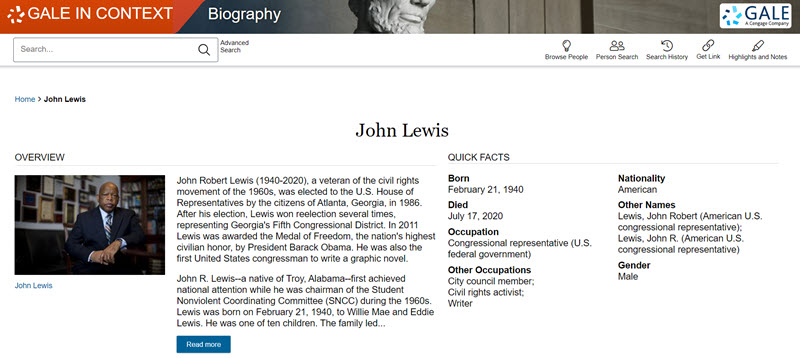| By Laura Avery |
John Lewis (1940‒2020), a veteran of the 1960s civil rights movement, was a U.S. congressional representative for Georgia from 1987 to 2020. Beginning his activism as a student, he was involved in several protests.
After a 1961 Supreme Court decision declaring all segregation in interstate bus depots and on buses illegal, Lewis participated in a “freedom ride” from Washington, D.C., to New Orleans. Despite the activists’ nonviolence pledge, they were brutally beaten during the ride and one of the buses was set on fire. Lewis also led marches against segregated movie theaters in Nashville, again prompting numerous arrests as well as physical and verbal abuse by local whites. Through it all, he maintained a path of nonviolence toward achieving civil rights.
On August 28, 1963, Lewis was one of the speakers at the March on Washington, an event that drew more than 200,000 demonstrators to the nation’s capital. The march was successful in pressuring the Kennedy administration to initiate a strong federal civil rights bill in Congress.
“Do not get lost in a sea of despair. Be hopeful, be optimistic. Our struggle is not the struggle of a day, a week, a month, or a year, it is the struggle of a lifetime. Never, ever be afraid to make some noise and get in good trouble, necessary trouble.”
—John Lewis
After his election to the U.S. House of Representatives in 1986, Lewis carried on the fight for civil rights. He remained a voice calling for a “sense of shared purpose, of basic morality that speaks to Blacks and whites alike.” In 1991, Lewis became one of the three chief deputy whips for the Democratic Party, one of the most influential positions in the House. In 2009, he watched as Barack Obama took the oath of office, becoming the first African American president of the United States. Lewis was the only living speaker from the March on Washington present at the inauguration.
Two years later in 2011, Obama presented Lewis with the Medal of Freedom, the highest honor that can be awarded to a citizen. Of the honor, Lewis told CBS News, “To receive it from President Barack Obama during African American history month, by the first African American president is so moving. It is almost unreal, is almost unbelievable.”
“When you see something that is not right, not fair, not just, you have to speak up. You have to say something; you have to do something.”
—John Lewis
In 2013, Lewis became the first American congressman to write a graphic novel. He hoped this format would inspire younger audiences to political activism. His graphic autobiography came out in three parts: March: Book One (2013), March: Book Two (2015), and March: Book Three (2016). The series was met with acclaim and bestselling status. The third book in the series went on to win the National Book Award for Young People’s Literature in 2016, the first time ever a comic book (or graphic work of nonfiction) won.
Lewis was skilled at using his powerful voice to help change routine House floor speeches into calls to action. He used this talent to push fellow Democrats to speak up. On June 12, 2016, there was a mass shooting at Pulse nightclub in Florida, the deadliest act of gun violence by a lone shooter in American history. Ten days later, Lewis led a sit-in on the floor of the House of Representatives to protest the inaction of House Republicans in passing gun control legislation. He said, “We have been too quiet for too long. There comes a time when you have to say something. You have to make a little noise. You have to move your feet. This is the time.”
“Choose confrontation wisely, but when it is your time don’t be afraid to stand up, speak up, and speak out against injustice.”
—John Lewis
Lewis became an outspoken critic of Donald Trump upon Trump’s election to the presidency in November 2016. In January 2017, he claimed that Trump hadn’t won the election legally and therefore was not the legitimate president and declined to attend the inauguration.
In December 2019, Lewis revealed he was being treated for advanced-stage pancreatic cancer; he passed away on July 17, 2020, at the age of 80.
His actions and words live on and continue to encourage people to stand up for justice.
You can read more about John Lewis and other civil rights activists in Gale In Context: Biography.
Not a Biography subscriber? Learn more about this authoritative database >>


